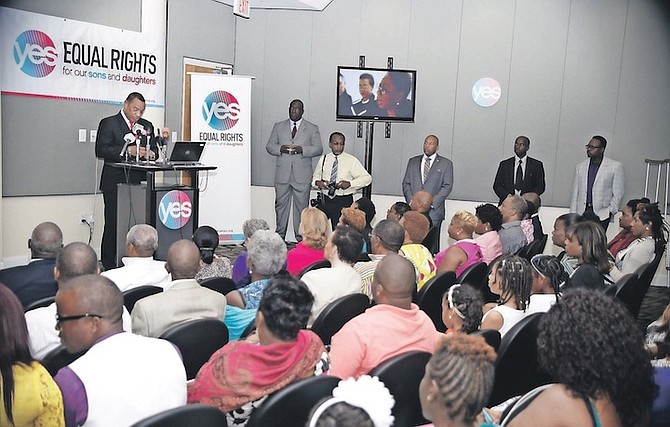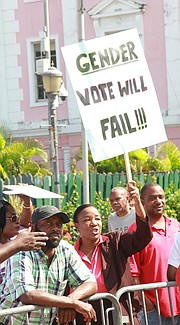IN 2014, then Prime Minister Perry Christie announced the gender equality referendum which was to be held in November of that year. The referendum was postponed numerous times until it was finally held in June 2016, and the majority of voters said “no” to all four proposed constitutional amendment bills. This week, there is discussion about the Davis-led administration’s plan to amend the Bahamas Nationality Act to bring gender-equal nationality law, avoiding another referendum which is required to amend the constitution.
One of the reasons for the rejection of the four constitutional amendment bills — three of which were specific to citizenship rights — was the failure of the government to recognize that a referendum is not an event, but a process. It is not enough to draft bills, set a date, and announce it to the public. Much more is required to meaningfully engage the public, ensure that accurate information is shared, and the electorate is confident in its understanding of what is being proposed and the outcome of consenting to the proposed changes. There must be sufficient resources, including time, money, and expertise, to educate and engage the public.
Even when information was shared and sessions were held to inform the public, it often did not start at the point that people really needed clarification. Presentations and conversations were largely focused on the four bills. This is, of course, important, but it is not enough. People needed to first understand the constitution. What is it? Where did it come from? Why does it have gender inequality in the first place? What does it mean that the constitution is supreme law? Why do we need a referendum to amend the constitution? How do we know that it is okay to amend the constitution? What is the difference, in effect, between amending the constitution and amending legislation? These questions get at the basics, and they help to give a better understanding of the course of action the government has identified as necessary and more effective than any alternative.
Aside from basic civic education — which ought to be a part of the school curriculum at all grade levels and in all schools — it is important to clearly state what the exercise is and is not meant to achieve. In addition, it is absolutely necessary to bust myths. When myths are widespread, repeated frequently by large numbers of people, they can easily drown out the truth. When it seems there are no responses to misinformation, it is easier for people to believe it. It was especially damaging, in 2014, that misinformation and myths were being circulated faster and before accurate information. The referendum was announced before the government was prepared to equip people with the information needed to make the best possible decision.
All four of the constitutional amendment bills seemed mysterious to the general public. People searched for a hidden agenda. They wondered what the government was trying to do, sure that we were not getting the full story.
The language in the constitution and the language used to explain the changes to it were not particularly clear. People needed to read and hear about the proposed changes in language closer to their own patterns of speech. It also would have been helpful to have more information about the way gender inequality in nationality law affect people, some of whom we know and love without having any idea what they go through to live and work in The Bahamas.
The first bill was to allow Bahamian women to pass on citizenship to their children. While Article 8 of the constitution states that anyone born outside of The Bahamas after July 9, 1973 is a citizen at birth if their father is a citizen, Article 9 says that those born legitimately outside of The Bahamas after July 9, 1973 and their mother (only) is a citizen of The Bahamas, they may apply for citizenship between the ages of 18 and 21. The difference here is clear. Whether or not they are born in The Bahamas, the children of Bahamian men and their non-Bahamian spouses are automatically Bahamian at the time of birth. The children of Bahamian women and their non-Bahamian spouses, when born outside of The Bahamas, do not get automatic citizenship, and they, constitutionally, may apply within a narrow window. The first bill intended to make it so that Bahamian women and men have the same right to pass on citizenship to their children when they are born within marriage and outside of The Bahamas.
The second bill was to allow Bahamian women to pass on citizenship to their spouses. Article 10 of the constitution specifically says that women who marry Bahamian citizens can apply subject to a set of exceptions and qualifications. There is no such allowance for the spouses of Bahamian women. The second bill intended to make it so that spouses of Bahamian women could apply for citizenship in the same way as the spouses of Bahamian men.
The third bill was to allow Bahamian men to pass on citizenship to their children born out of wedlock. Article 14 of the constitution says that, where a child born out of wedlock is concerned, any references to father (within this chapter of the constitution) should be take to mean the mother of that child. Such children, then, are considered to have no fathers. This is what prevents Bahamian men from passing on citizenship to their children born out of wedlock.
On referendum day, the majority of the people who showed up to participate voted no on all four constitutional amendment bills, including the one that aimed to add “sex” to the prohibited grounds of discrimination in Article 26 of the constitution. For many, that seemed like the end of the discussion. As we now know, it was not. Gender inequality still exists in the constitution. There are still Bahamians who are unable to pass on citizenship to their spouses and children. These people are affected in various ways, from spending time and money on resident and work permits to living elsewhere because it is too difficult and exhausting to navigate the systems here. We still need to address this issue.
Legislation will not completely solve the problem. It is a temporary fix until we are able to make the necessary changes to the constitution. Amending the constitution requires a yes vote from the majority of the people who vote. Amending legislation does to have the same requirement. It also does not have exactly the same effect.
The government is responsible for recognising, upholding, and expanding human rights. It must take action to ensure that people can pass on citizenship equally. It cannot do this through the constitution without undertaking the referendum process, regarding and planning for it as more than a one-day event. It can, however, make changes to legislation to give people who have been previously excluded the ability to access citizenship rights.
The Attorney General has announced that the Bahamas Nationality Act will be amended for this purpose. The Prime Minister, though, has stated that gender-equal citizenship is not a priority for this administration, so this is not expected to be addressed this year.
As we have come to expect, a the leader of a particular religious lobby group has objected to the legislative amendment. He questioned this route, suggesting that if it was legitimate, it would have been done instead of two referenda. He clearly lacks understanding of the law, the difference between the constitution and legislation, and the commitments The Bahamas has already made to recognise, protect, and promote human rights which cannot depend on the whims of people. It is important to note that the constitution is supreme law. Legislation is useful, legislation can be changed, and legislation can be challenged. Ultimately, we need gender-equal citizenship rights enshrined in the constitution. Until we are able to do that, we need to use what we have, and that is legislation. Surely, there is no good, loving God who would object to gender-equal nationality laws, the protection of women’s human rights, or children’s right to nationality.
As the government continues to delay the amendments to the Bahamas Nationality Act, it must be reminded that this is not enough. It is one step that is important to take, not on its own, but while we work toward the necessary amendment of the constitution. This requires a properly planned and resourced process which must include a robust public education and sensitisation campaign.
The Committee on the Convention on the Elimination of All Forms of Discrimination against Women (CEDAW) made it clear in its recommendations to the government at the 2018 review that another referendum needs to be held, and that there must be a plan and timeline to address gender inequality. There is more work to be done to meet obligations to the Bahamian people — to Bahamian women — that were made at various times in various spaces, including the ratification of CEDAW and the adoption of the Sustainable Development Goals (SDGs). In the coming months, The Bahamas is required to report on its progress in various areas, including gender-equal citizenship, to treaty bodies. Years have passed, and the situation is the same. The government will need to have more to say than, “We’re thinking about it,” or “It soon come.”
In a few weeks, Equality Bahamas is training young people on advocacy for gender equality in nationality rights. The work of civil society must continue, and it must involve young people. Those who are interested in participating in the interactive training to become youth advocates for gender-equal nationality law can get more information and apply at tiny.cc/youth4nationality.







Comments
Flyingfish 1 year, 8 months ago
The reason why the 4 referendum bills were rejected was misinformation and lack of info. Either through negligence or intention the government refused to properly explain what each bill would bring. People were led to believe things about the bills that wasn't the case because of the government not informing Bahamians and muddying the waters.
All you needed was the PM to come on TV with a journalist asking him questions in relation to the bills and the properties and people would understand. The same bills would pass today and even possibly then if they explained the bills.
The reason why there isn't backlash to the bills being implemented now is because it was always popular enough but was very fishy and not understood by voters. Bahamians being a cynical electorate hate the wool being pull over their eyes and voted no in protest.
Sign in to comment
Or login with:
OpenID